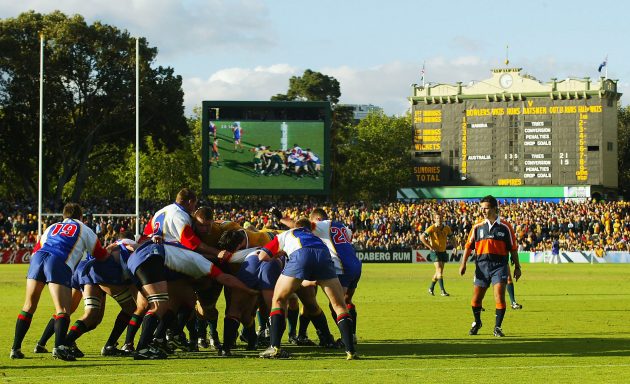Namibian Kees Lensing recalls a the 142-0 loss to Australia in 2003. From the September issue of Rugby World.
IT’S STARTLING what little things you can take away from a hefty loss. Some clam up. Some seethe. Some scheme. But after representing Namibia on the wrong side of a record defeat in the Rugby World Cup, losing 142-0 to the Wallabies in Adelaide in 2003, Kees Lensing learnt to turn the radio off.
“To this day, if I hear Thunderstruck by AC/DC, I hate it,” says the former loosehead, who will be head coach of Seattle Seawolves in Major League Rugby next season. “It’s nothing against the band, but that was the last song the boys played as we got off the bus for that game. Every time I hear the song now I think ‘s***!’ A lot of kids think ‘Oh, that song will get me up and going’ but for me it has a totally different meaning.”
To this day he will only open up about the record result if someone asks for his thoughts, saying: “I’m not going to go to a barbecue and start talking about it.” He remembers much of the game against Australia vividly but understandably tries not to relive what was a brutal experience.
Even now, building towards the 2019 World Cup in Japan, Namibia are one of the most under-resourced sides in the showcase. They have been at every World Cup since 1999 but have always had logistical battles, financial fights and a lack of elite avenues for their best home-based players.

Dejected: Namibia under the sticks again (AFP/Getty Images)
Lensing explains the situation in 2003. “World Rugby, which was the IRB back then, put on one of the best-organised tournaments ever. It was amazing. So those parts – the buses, the food, the hotels and stadiums – were really good, well organised. But Namibia had really bad-quality jerseys. For one game we didn’t have any shorts to play in.
“Adrian ‘Moose’ Skeggs, who used to play for the Reds, got involved with us. He somehow got us some Canterbury shorts. But they weren’t a Namibian sponsor, so we couldn’t play with them with the logo on them. So we got into the changing room, they gave us these new shorts and some permanent markers. They said, ‘You can play with these shorts but you must colour in the Canterbury sign, otherwise Namibia are going to get a massive fine.’
“Literally ten, 15 minutes before we went out on the field, everyone was sitting there with a permanent marker and colouring in the Canterbury sign. Otherwise we didn’t have shorts.”
Sartorial issues aside, what happened to you on that fateful day in Adelaide?
Lensing muses. “We would kick off, they maul us up to the halfway and then pass the ball to one of Lote Tuqiri, Chris Latham, Mat Rogers – he was electric – or Stirling Mortlock. Hey, the whole team was legends.

Power play: David Lyons carries hard (AFP/Getty Images)
“I remember going into the changing room at half-time – the score was 69-0 – and we had to walk to the left of the pavilion. I was thinking, ‘We’re in big trouble’. Because the first half was when we were fresh and had our better players on. The second half was when they would open the taps.
“The main talk was that we needed to slow it down and keep possession. For that whole game there was maybe five minutes where we managed to keep the ball, but you must remember they had guys like George Smith. Our ball security wasn’t good enough, we weren’t strong enough.
“Weather-wise it was a perfect day. The weekend before we played Ireland in Sydney and it was raining. Ireland were a really good team as well and I’d say if it hadn’t rained, we probably would have had a very similar result. We kept the score more respectable (64-7). It was a big hiding, but the rain maybe meant they played more conservative. In Adelaide, you couldn’t complain about the weather at all.”
Lensing admits that he never imagined in his darkest nightmares that another international side would put 100 points on them. When the Wallabies ticked past the ton, his thoughts turned to Japan’s loss to the All Blacks in 1995, when the Kiwis won 145-17. He hoped they wouldn’t lose that badly.
But their deficit was to be bigger.

Splashdown: Lensing takes a moment against Australia (AFP/Getty Images)
Lensing, who was 25 at the time, is proud of how he kept battling on, but he admits that some veterans were already ‘at the bar’ when the Australians started really cutting loose. He understands that this was some lingering amateurism. By the next World Cup in 2007, there was a management clearout, a new approach and more World Rugby investment.
Jump to Japan this year and Lensing is full of hope that Namibia can claim a first-ever World Cup win. The realist in him admits it will be tough and that Canada, who he feels the team should target, are still a very good side. But against every team, even the All Blacks and the Springboks, the team will tear themselves apart from the cause.
“It’s a Namibian culture thing: we will go flat out,” he explains. “Think of 2011 when Chrysander Botha tackled the Beast (Tendai Mtawarira) from the front. That never should have happened, he is maybe 80kg and the Beast is about 120kg, but he decided ‘You’re not going to run over me’. The kid put his body on the line. That kind of commitment you are going to get from all the Namibians.”
Who cares how hard the scoreboard operators work with heart like that.
This feature first appeared in the September issue of Rugby World.





